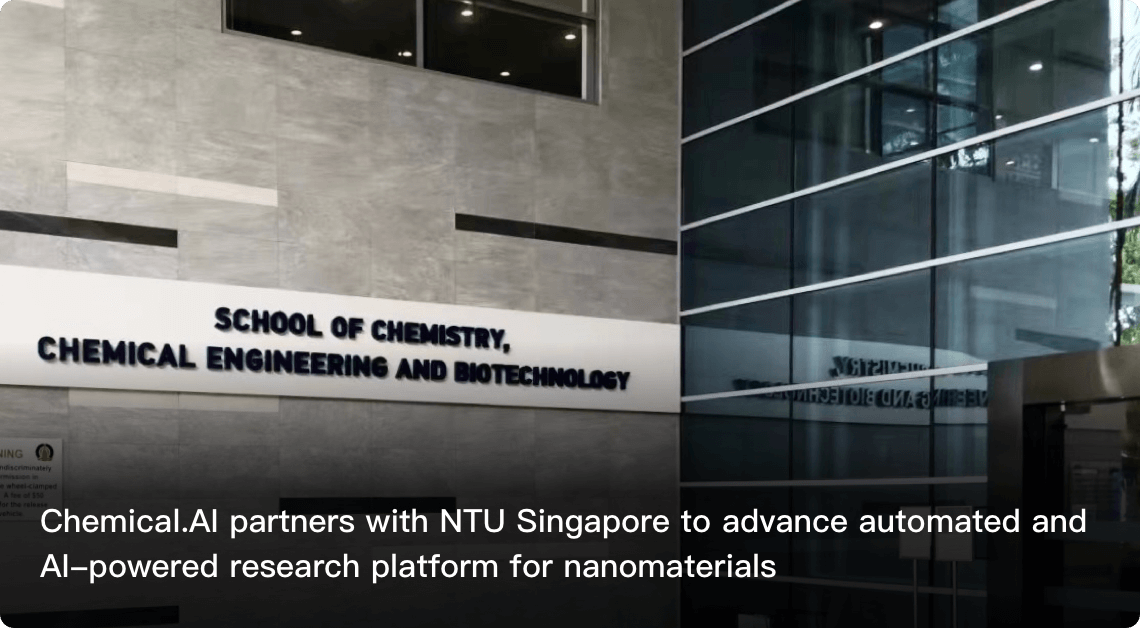
Chemical.AI recently announced a partnership with Nanyang Technological University, Singapore (NTU Singapore) to advance the automation progress in nanomaterials labs. Under this agreement, Chemical.AI will build the first automated research platform for NTU's nanomaterials studies that enables synthesis, functionalization and measurement.

With integrated technologies of algorithms and equipment, Chemical.AI provides a fully automated and intelligent solution for nanomaterial synthesis, experimental process and analysis. Chemical.AI will also help NTU consolidate experimental data, establish databases of reaction conditions and results, and develop AI models to optimize reaction conditions for the synthesis of nanomaterials and to identify compound ingredients based on optical spectrum.
This collaboration is expected to significantly enhance the performance and efficiency of nanomaterial R&D by facilitating independent analysis of large experimental datasets, as well as making synthesis and measurement processes more intelligent. It sets a strong precedent for future explorations and research in novel materials.
“We are honored to start a long-term collaboration with NTU Singapore,” said Dr. Ning Xia, CEO of Chemical.AI. “Chemical.AI always aims to support chemists in various disciplines by optimizing lab productivity and accuracy. With our cutting-edge algorithms and profound lab experience, I'm confident that this platform will revolutionize novel material discovery and analysis.”

ChemAIoT, Chemical.AI's self-developed AI + automation solutions for chemical lab, leverages over a decade of chemical informatics as its foundation and 60 million chemical big data as its backbone. It enables hybrid robots utilizing proprietary AI algorithms to achieve full-process automation and intelligence in chemical laboratories across various fields.
Designed to address real-world chemical lab needs and chemistry challenges, Chemical.AI algorithms can be utilized to customize reliable lab automation solutions and optimize lab module navigations. Each workstation carries out tasks autonomously and collaborates with other stations or a human researcher whenever needed. ChemAIoT is highly compatible with various third-party devices that can integrate with current laboratory equipment. It helps build the Internet of Things (IoT) and collect experimental data for AI modelling.
“NTU Singapore is committed to advancing research and development in nanomaterials, and we are excited to embrace digitalization and automation of our research work with Chemical.AI technology,” said Professor Xing Yi Ling from School of Chemistry, Chemical Engineering and Biotechnology. “With AI empowered syntheses and measurements, our scientists now have more time to concentrate on creative thinking, affording boundless possibilities for novel discoveries and expanded applications.”
About NTU Singapore
A research-intensive public university, Nanyang Technological University, Singapore (NTU Singapore) has 33,000 undergraduate and postgraduate students in the Engineering, Business, Science, Medicine, Humanities, Arts, & Social Sciences, and Graduate colleges.
Ranked amongst the world's top universities, the University's main campus is also frequently listed among the world's most beautiful. Known for its sustainability, NTU has achieved 100% Green Mark Platinum certification for all its eligible building projects. Apart from its main campus, NTU also has a medical campus in Novena, Singapore's healthcare district.
About Chemical.AI
Founded in 2018, Chemical.AI leverages proprietary algorithms, comprehensive chemical data, and cutting-edge robotic lab automation to enhance chemical synthesis efficiency. With offices in Shanghai, Wuhan, Singapore, Boston, and Toronto, Chemical.AI has a team of 150 multidisciplinary experts skilled in retrosynthetic planning, automation, and lab digitalization, coupled with a rich database of chemical information and algorithms to pave the way in delivering advanced solutions across diverse sectors such as pharmaceuticals, biomedicine, chemical engineering, and new materials.
Contact: pr@chemical.ai




